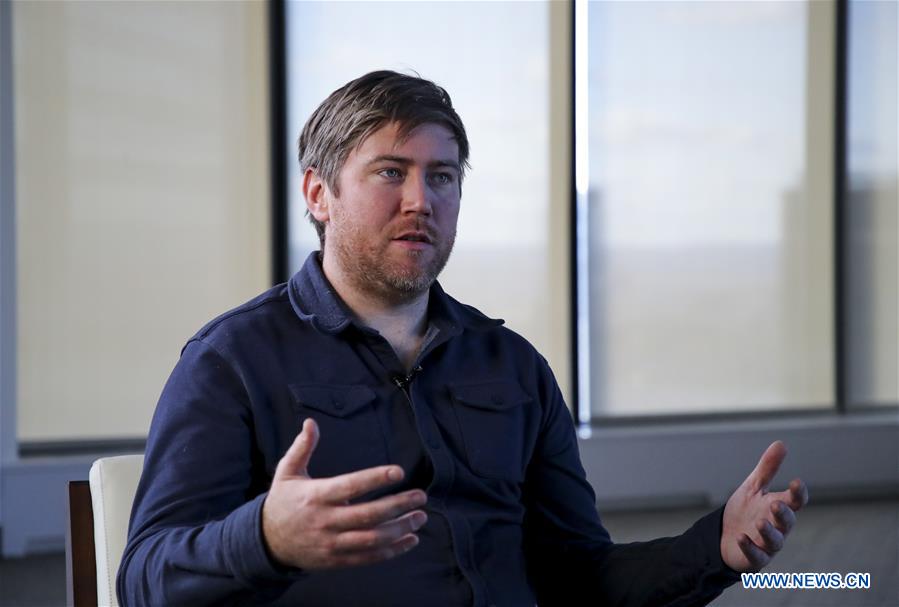 ?
?Matthew Iles, CEO of Civil Media Company, receives an interview with Xinhua in New York, the United States, Nov. 8, 2019. Civil Media Company, a New York City-based blockchain-for-journalism startup, has set itself an ambitious task of building a trusted web through blockchain technology to challenge the eyeball economy and social media giants like Google and Facebook. (Xinhua/Wang Ying)
by Xinhua writer Yang Shilong
NEW YORK, Jan. 10 (Xinhua) -- Civil Media Company, a New York City-based blockchain-for-journalism startup, has set itself an ambitious task of building a trusted web through blockchain technology to challenge the eyeball economy and social media giants like Google and Facebook.
"We want the Civil platform to stand for being a trusted place for trusted content. And that's the promise blockchain technology holds," the company's CEO Matthew Iles said in an exclusive interview with Xinhua.
A PLATFORM BUILT ON TRUST
The nearly two-year-old Civil rolled out a decentralized platform in March 2019 through blockchain and community governance. The newsrooms that have joined Civil are granted exclusive access to tools like the Civil Publisher, which allows them to permanently archive content to the Ethereum blockchain and so they cannot easily be taken down, according to Iles.
In the meantime, community members ensure these newsrooms abide by a strict set of journalism standards and ethics known as the Civil Constitution. Community members can challenge a newsroom that violates the standards and use decentralized voting credits known as "Civil tokens" to determine whether the newsroom should be removed.
"Blockchain, when it comes to media and news, does have the potential to make a big dent in the 'fake news' problem, specifically when it comes to knowing the source of a piece of content," Iles said.
The company's "next major piece of software" will be the Civil ID -- a kind of universal identity system for the web, said the young entrepreneur. "In many ways, it completes our platform."
The software will enable newsrooms to authenticate and control their content as well as own and govern their data, in order to better protect and monetize their original work.
"What that really means is that the user is the one who's in control of their identity payments and data. There isn't a password stored in some company's database that could potentially be hacked or stolen," Iles said. "We want to bring some of the benefits of this technology to journalism."
A WAY FOR JOURNALISM TO THRIVE ON WEB
Civil's mission from day one has been to provide a sustainable future for journalism on the web, said Iles, who spent years analyzing the ups of Google and Facebook and the downs of media outlets. "Eyeballs were going to these giant platforms and more and more news organizations were going out of business."
In his opinion, a handful of corporations are controlling what readers see, and their principal business models are largely the same -- "collect as much information about the readers as possible in order to stimulate and sell their attention."
"I want to see news organizations thriving again. The vision fundamentally is that we must find a way for the web to be an open, trusted place. And I don't think that Civil is alone in thinking that," he said.
More than 70 newsrooms from around the world with over 1,000 individual journalists have joined Civil. As Iles said, "Civil is on every major continent. We have roughly 500 token holders, apart from those journalists who are members of the public who have contributed and who want to support the project."
Civil is getting ready to field test the Civil ID for proving, tracing and monetizing content amongst trusted publishers, according to Vivian Schiller, chairwoman of the Civil Foundation.
The idea is to build a marketplace for newsrooms to share their content with whoever they see fit, and with terms they control, she said. "We're first piloting with some well-known publishing partners we'll be announcing soon to demonstrate how the Civil ID can increase revenue for their licensing business."
"We'll use the same technology infrastructure to help small to midsize newsrooms do the same via WordPress Newspack, followed by other common content management systems," Schiller added.
Iles said Civil is also offering an embeddable fund-raising tool called "Boosts" to help newsrooms make money by increasing audience engagement and reader revenue.
"Project Boosts" allow newsrooms to host one-off fund-raising campaigns on their websites for things like expanded coverage or travel costs; "Story Boosts" enable quick, direct payments to newsrooms at the bottom of every article, and readers can contribute with credit cards or cryptocurrency, Iles further explained, while stressing that all the money goes to the newsrooms and Civil does not take a cut.
Readers will soon be able to use the Civil ID for single sign-on, one-click checkout and other friction-free benefits across the Civil network of trustworthy newsrooms, according to Iles.
"All of this will be done without a centralized middleman controlling identity, payments or data. This is our vision for the trusted web," he said.
A CLEAR VISION, A HARD BATTLE
All that said, Iles admitted the difficulty of getting a startup to grow.
"The hardest thing has been that the long-term vision is actually quite clear to us, but mapping how to get there has been difficult," he said. "But what gives us clarity of vision and the energy to get up every day is that this work must be done."
"We were able to break through the noise a bit and get attention around the world because we were talking about how really radical change was required in order to introduce any kind of improvements to the system that could have a lift-of-all-boats kind of effect," he said.
For Civil to succeed ultimately, Iles said it needs to ship products that make news organizations money. "That's the path to long-term viability."
Iles also suggested that the younger generation of reporters be more business savvy and more entrepreneurial in an age of fast-evolving media technologies.
"Being a reporter and not really even understanding the business of your news organization will be hard," he said.











